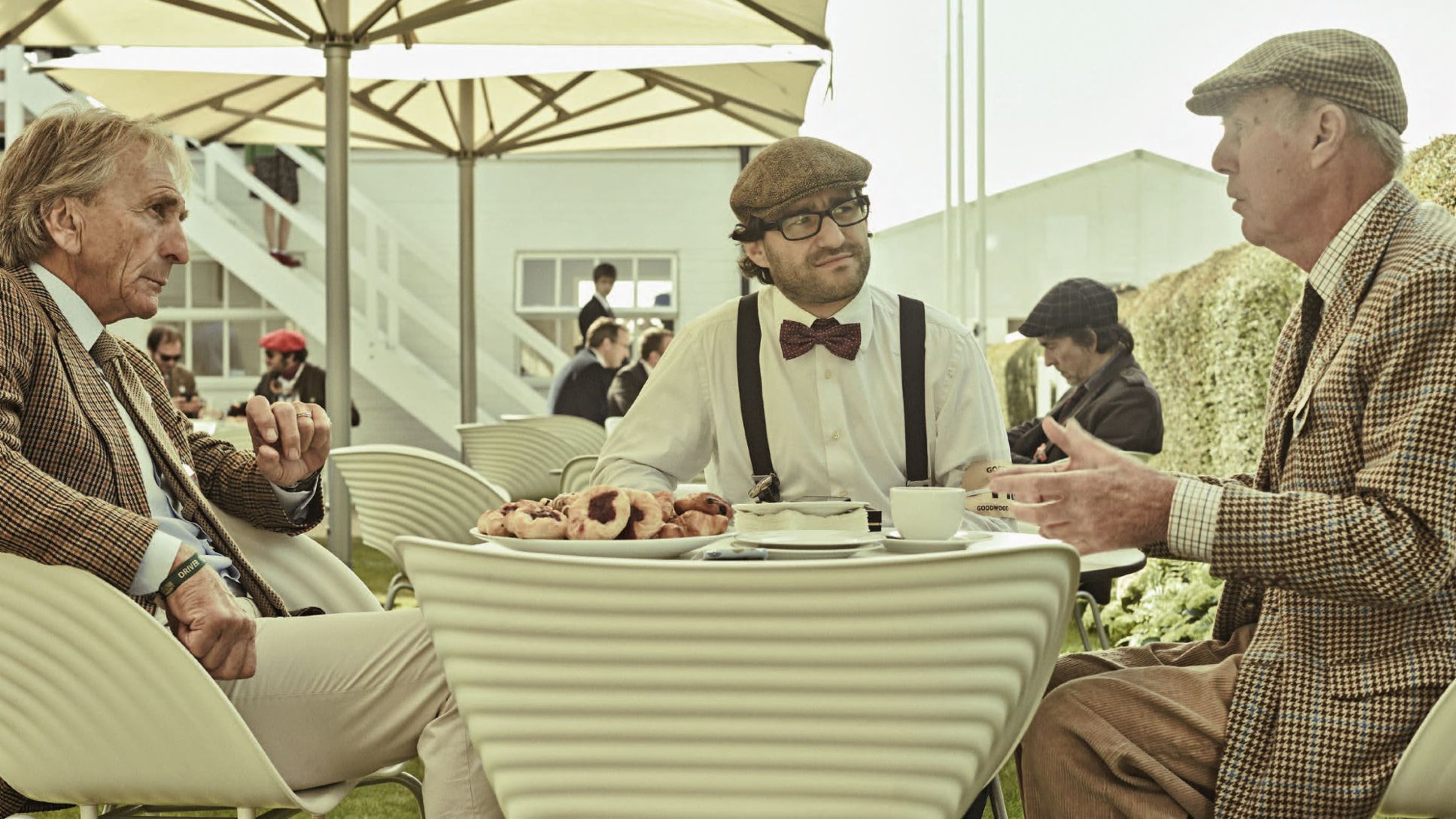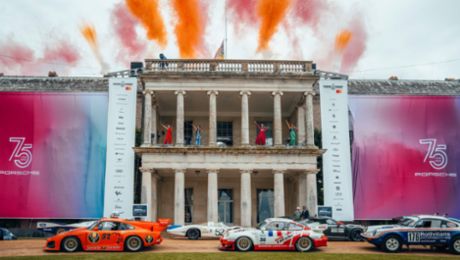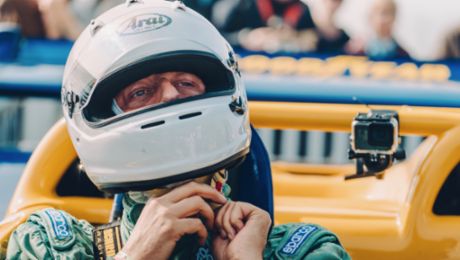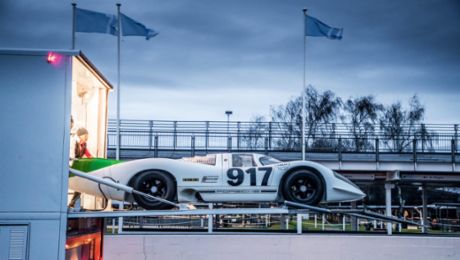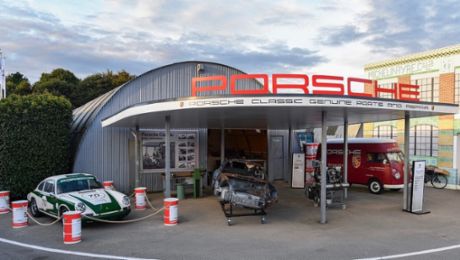We meet the winner of Le Mans in the Credit Suisse Race Control Center at the Goodwood Revival to talk with him about the secret plans of Hans Herrmann, what the legendary 917K is really all about and what makes a good teammate in Le Mans. And then a very special friend spontaneously joins in.
You can tell that the young guy at the entrance of the Credit Suisse Race Control Center in Goodwood is obviously embarrassed. “I’m awfully sorry,“ he says again, averting his gaze. Just a few minutes ago, he refused Richard Attwood access to the center. He simply didn’t recognize the Le Mans winner. Or rather: he didn’t know him. Attwood is taking it easy. “I guess even his parents are too young to remember Le Mans in 1970,“ he says, laughing. Then he takes a seat in the garden. With a cup of tea.
Mister Attwood, what do you feel sitting here in the garden of the reopened Race Control Center?
I was here just a few days ago when we did a driving presentation with the Porsche 918. I still remember the original center, which was kind of a fortress with narrow corridors and small rooms – it had a lot of character. I liked it. The reopening was necessary. People don’t just come here to have fun, they are here to drive races – and it’s still a fast track.
What does Goodwood mean to you?
Goodwood is very special. I think I drove my first race here in 1957. And I drove a lot here before the track was closed in 1966. Many people from those days are here for the revival and many younger ones love it, too. Especially the young drivers appreciate the ambience, even those who have never done Le Mans. Everybody feels at ease here, they participate and each one makes a contribution – even with their clothing.
With Hans Herrmann, you brought home the first Le Mans victory for Porsche in 1970 and you’ve been loyal to the brand ever since. What does Porsche mean to you?
That’s very difficult for me to answer. I have so many emotional ties to Porsche and this brand plays a major role in my life. I used to drive a Porsche privately long before I did as a professional racing driver. One thing I can say is that a huge part of the Porsche myth is predominantly due to the engineering. That’s why this brand captivates so many racing enthusiasts.
Can you give us a concrete example?
At the time when I was still actively driving races, we were always told to drive to races in our 911s, no matter where we went in Europe – because that’s what people wanted to see: they wanted to see how race drivers drove exactly these cars. Porsche has always built the best street-legal cars.
Are you saying this due to your attachment to the brand or as a diehard race driver?
Look, on one of these trips I was in my 911 and met with a 300 SL. We drove a really nice route together near Geneva. We had a lot of fun on this trip, although I have to admit that the SL was a little faster than me. I couldn’t believe it at first but then I realized that a 3-liter engine powered the SL. My Porsche had a displacement of only two liters – and was still able to keep up. What more can I say.
Which one is your favorite Porsche?
Really, there is not just one model. It always depends on what you want to do, where you want to go and which demands you make on the car. On one day, I go for the Panamera, hybrid or Diesel, the next day I prefer the 911, or if you want to have fun on a weekend, I also like to take the Boxster. There is really a car for every purpose. But if it’s about a car that impresses everybody in every single phase, then that’s certainly the 911 Turbo. It’s just an absolutely fantastic car.
Are you referring to the current Turbo, the 991?
Of course. Why take an older one if you can have the new one, too.
Is that the typical mindset of a race driver? The latest technology, the newest innovations are mostly superior to the old ones?
Well, yes, cars develop further and are obviously becoming better and more efficient. It would be bad to reject progress here. That doesn’t mean that you’re supposed to despise classic cars. If I ask myself which car I would like to own, then I’d say a 911 from the late 1960s. Here, the state of the art is 50 years old and what is more, it’s difficult to handle such a car – but it gives you a very satisfying feeling to drive it well.
Which Porsche have you never gotten the chance to drive though you would have liked to?
I think there is none. Which doesn’t mean that I’ve driven them all. Quite the contrary. I definitely haven’t driven the new prototypes. But would I like to? I don’t think so. These machines develop far too much output for me, the strain on my body would be too much, if only for the G-forces.
Do you own a Porsche?
No, not anymore. I had several, all street-legal, and I had a 917 from 1978 to the year 2000. I had bought the car because I knew that it would rise in value – and it was the car that I loved most. I had always considered it as the provision for my old age. Then, in 2000, I cashed in. The question was: Do I sell the house or the car? Well, the car had to go.
After winning Le Mans in 1970, Hans Herrmann ended his racing career. He had promised it to his wife. What did that do to you during the race? Is it an additional strain on the driver knowing that his teammate intends to end his career in the event of a victory?
I didn’t know about it during the entire race and I’m really happy about that. Otherwise, it would have increased the pressure even more. This way, it was simply a race. We did a good job and had a great result in the end.
When did you learn about the end of your teammate’s career?
I can’t say when exactly. After the victory, there was so much hustle and bustle and excitement. I think I surely heard it on the track but it might also be that I was told a few days later.
What’s your relationship to Hans Herrmann like today?
It’s very good. We meet from time to time and these moments are always nice. When Hans and I became teammates, it was my second year at Porsche. Hans didn’t speak English and I didn’t know any German. But it didn’t matter, because if you share a common goal, then the language barrier is no obstacle. We got along very well, using sign language. And we referred to the curves by their names. So it was clear, which one we meant.
Have you learnt any German in the meantime?
Not really. I can order breakfast and book a hotel room. Other than that, it’s expressions like “Alles klar!“, for instance. I’ve tried to learn German but I’ve never really managed to. I do speak French, though, but it didn’t work out with German...
And while Richard Attwood is going through his memory looking for his few scraps of German, Derek Bell suddenly sneaks up. He had been sitting at a table with Sir Stirling Moss and Jochen Mass just a few inches away and then discovered his former teammate Attwood. He’s nosy and asks about the occasion for his interview and then they’re already chatting their way. The central topic: Le Mans, of course, and Porsche, of course.
When it comes to the cars, however, they have slightly different opinions: while one of them, Mr. Attwood, established the myth of the 917, the other one, Mr. Bell, demonstrated the unparalleled predominance of the legendary 962. Two race drivers who have contributed significantly to Porsche’s story. Very interesting: the teammate…
BELL: In Le Mans, the relationship with your teammate is a completely different thing compared to modern F1, for example.
ATTWOOD: Absolutely. You’re a real team and not competitors. You want to attain a common goal.
BELL: You basically sleep with your teammate. That reminds me of an anecdote. I took my son with me to a race once and back then we still slept in these small caravans. As we were strolling through the camp together, my teammate’s caravan was moving rhythmically up and down. Very fishy! My son asked me: “Dad, what’s happening over there?” Well, and there I was thinking: What I am supposed to say now?
Was the teammate’s name Richard, by any chance?
BELL: Oh, no. That was during the 962 era. But I definitely won’t tell you the name of the teammate.
Simple question: 917 or 962?
BELL: Simple answer: 962.
The predominance of the 962 was impressive. Was it really as simple to win in this car as it seemed?
ATTWOOD: Yes.
BELL: No, certainly not. You have to be aware that at the start of the race you know: I can win. But you know, too: The others can only win if I don’t. That’s a completely different situation and it’s certainly not any easier. I remember a race in Silverstone: We were only allowed to drive in the fifth gear because otherwise the 962 would have consumed more fuel than the regulations allowed.
ATTWOOD: For me, giving an answer is not that easy. Still, I’d probably go for the 917.
BELL: Was it really that bad?
ATTWOOD: At the beginning, the car was a nightmare. The roaring of the exhaust and the acceleration gave me a headache. I couldn’t find as many earplugs as I would have needed. When the car broke down in Le Mans in 1969, we were leading by far, but I was jolly glad to get out of this vehicle. People came up to me and said: You could’ve won Le Mans, you were far ahead. But I didn’t bother at all. In the course of time, we improved the car bit by bit and by the end it was really a great car.
What do you two think of Porsche’s comeback in Le Mans?
ATTWOOD: It’s a great thing. And I do think that the result was very good. To lead the race two hours before finish, hats off! Now they have one year to resolve the problems and next year, we will experience a very strong Porsche team.
BELL: I think that the development is exciting in general, not just from Porsche’s perspective. The whole topic of hybrid, the different approaches: Porsche is the only carmaker here with two energy recuperation systems. I just wonder: Does it only interest people like you and me, Richard, or are the spectators interested in these things, too? I haven’t come up with a clear answer yet. To the spectators, entertainment counts…
This nice chat now comes to a close as spontaneously as it came about. There’s much hustle, not only here at the Credit Suisse Race Control Center, but generally in Goodwood. Derek Bell has got to go and a look at his watch tells Richard Attwood, too, that it’s time to leave. A short goodbye. They will meet again, of course. Somewhere. Someday. And all that’s left is an empty cup. And an embarrassed boy at the entrance to the Race Control Center, who has learnt a lot today.
More information about this year’s discussion at the Credit Suisse Race Control building can be found at: www.credit-suisse.com/classiccars
Info
Text first published in "rampclassics", issue 4
interview: Matthias Mederer // photos: Benjamin Pichelmann
